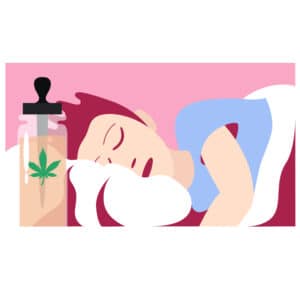
Do you ever have those nights where you don’t feel restful enough, no matter where you are? Maybe you’re struggling with stress or feeling under the weather and can’t get comfortable. Regardless of the reason, it’s safe to say that in those moments, some of us would do just about anything to get some rest.
Maybe it won’t surprise you to learn that a growing number of people are giving cannabidiol (CBD) a try before bed.
Can CBD Actually Help with Sleep?
To understand the role that CBD may have in promoting restfulness, we need to understand the way in which the body’s endocannabinoid system uses cannabinoids like CBD throughout the body. CBD is short for cannabidiol, and it’s the dominant chemical compound of the hemp plant. As a cannabinoid, it has the unique ability to bind to receptors in the body’s ECS, or endocannabinoid system, to promote regulation and balance.
Cannabinoid receptors in the nervous system and brain largely pertain mood and physical sensation. When we give our body cannabinoids like CBD, they attach to these receptors and allow the body to better regulate and balance out healthy systems.
Numerous studies have found that CBD may help balance our sleep cycle by regulating neurotransmitters involved in the sleeping process like melatonin, cortisol, and serotonin. For this reason, CBD is often described as useful for those who deal with active minds. Due to its effects on melatonin it may also help regulate the overall sleep cycle. This is of particular interest to those who are traveling or working late shifts.
Which Types of CBD Products are Best for Sleep?
Now that you know that CBD may play a role in promoting better sleep, let’s talk about choosing the best product possible. Not all CBD products are equally capable of having a noticeable effect on sleep.
Choose an Internal Delivery Method
Internal delivery works best here, as topicals only regulate the functions of the area they’re applied to directly. Therefore, use products like edibles, capsules, or tinctures to get CBD that can interact with the receptors involved in sleep.
Full Spectrum is the Best Choice
We recommend a full spectrum product as opposed to one made with CBD isolate. CBD isolate delivers pure cannabidiol to the body, which may be adequately helpful all on its own. However, full spectrum is potentially more effective. That’s because full spectrum contains not only cannabidiol, but an array of compounds in the plant material including additional cannabinoids, terpenes and essential fatty acids that can all be beneficial.
What if You are Already Taking Medications for Sleep?
If you’re taking a medication for sleep, it is important to be mindful of how this can interact with CBD. Cannabidiol may suppress an enzyme called CYP3A4, which is responsible for breaking down certain types of medications. When this enzyme is suppressed, medication doses can accumulate in the body to potentially dangerous levels. This is important to discuss with your doctor before starting a CBD routine.
A popular natural solution for sleep is melatonin, which mimics the naturally occurring hormone in the brain that regulates our sleep cycle. An influx of companies in our industry are producing CBD products infused with melatonin, formulated specifically for nighttime use. If you are already taking melatonin for sleep, you may want to avoid a CBD product that contains melatonin in it. Taking too much melatonin at once can actually produce the opposite effect and disrupt your sleep cycle further. For this reason, we believe it’s best to have separate, dedicated CBD and melatonin products.
What to Know About Taking CBD for Sleep
When taking cannabidiol in an effort to get more sleep, it’s important to do so from an informed perspective. This ensures that you end up getting the results that you’re looking for safely. How and when you take your CBD matters tremendously when it comes to seeing the most benefit.
#1: See Your Doctor
You should always speak to your doctor before starting a new CBD routine. Only your physician can consider your medical history and medications to personalize an effective routine. Additionally, they can help suggest specialists for sleep issues. These specialists can rule out any underlying conditions causing poor sleep.
There are all kinds of conditions that can interfere with sleep, ranging from dietary deficiencies to neurological disorders. Only a somnologist – the fancy word for sleep doctor – can properly determine whether or not your disturbances are caused by a medical condition.
#2: Take Your Doses at Night
Make sure to take your dose of CBD at nighttime so that its effects peak when you want them to. With tinctures, take a dose about 30 minutes prior to going to sleep. With edibles and capsules, take a dose about an hour beforehand.
#3: Consider the Delivery Method
Everyone’s experience with hemp is unique, and you may find that one particular delivery method works better than another.
For instance, edibles can take a couple of hours to really peak, but the effects can last for up to 8 hours, which is great for those who wake up frequently. Tinctures kick in faster and last for only about 4 hours, which can be useful for those who struggle with falling asleep.
#4: Pay Attention to the Milligram Strength
CBD comes in a variety of milligram strengths, reflecting how potent each dose will be. Naturally, higher milligram strengths can give you stronger effects pertaining to sleep, so choose your strength carefully. One of our standard strengths for tinctures is 40mg per milliliter, or 1200mg per 30ml bottle. For edibles and capsules, 10 to 25 milligrams per piece is standard. You may find that a higher amount is actually more capable of delivering the results that you’re looking for, but it’s best to start with the standard amount in the beginning and then work your way up as needed.
#5: Take CBD Nightly
Try getting into the habit of taking the same amount of cannabidiol each night. We know that cannabinoids can be more effective over time, and that a consistent routine can be more effective overall. This is because it provides the body with an ongoing supply of cannabinoids to use as needed. In other words, for the best long-term results, don’t just take CBD sporadically when you’re not feeling restful.
Also, if you’re taking a CBD product with melatonin, you should take it under the supervision of your doctor. Long-term melatonin use may not be suitable for everyone and may actually make sleep problems worse if taken for prolonged periods.
#6: You Can Double Up on Products
You can take two types of CBD products at night if you find that one just isn’t enough. Many people take a tincture followed by an edible. Tinctures wear off after about 4 hours while edibles can last for up to 8 hours, which means that cannabinoids will be present in more active levels while you sleep.
One exception to keep in mind is that it’s not advisable to double up on melatonin-containing products As we previously mentioned, taking too high of a dose of melatonin can exacerbate difficulty falling and staying asleep.
Sweet Dreams with CBD
Sleeping problems are extremely common, and in most cases, fixable. With its unique properties, cannabidiol (CBD) may be a simple solution for some. We recommend that you work with a sleep doctor in particular to determine the underlying cause of your sleep troubles. Bring up CBD with them to determine if it could help you have more restful nights.
